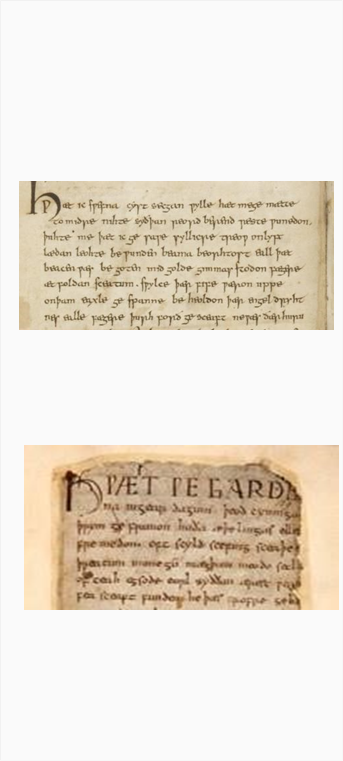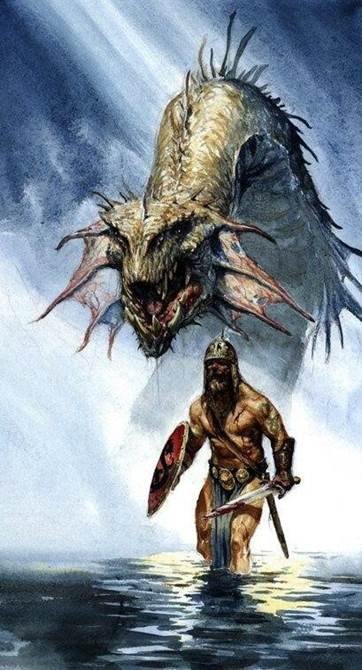Робочий аркуш (a worksheet): "Early Medieval Poetry. Beowulf"
EARLY MEDIEVAL POETRY
ABOUT THE OLD ENGLISH POETRY
English literature began with oral songs and heroic poems. According to the Germanic poetic traditions, the language in verse
was archaic, with frequently usespontaneously. In order to enjoy such poetry we must learn to ignore the fixed numberd phrases or formulae, developed to help the scops (singing poets) fill out their lines of syllables in verse lines, the regular pattern of stress (iambic or trochaic feet), and rhyme. The essential poetic unit was the four-stress line, divided by a caesura across which stress-syllables alliterated. Alliteration (or head rhyme) was the only requirement. Old English poetic language , which knew no rhyme, stanzas, or refrains, was built out of special formulaic vocabulary providing several terms for lord (master, king, leader, liege, commander), spear (lance, pike) and so on. The dignified poetic speech of Old English poetry always kept afar from everyday English and remained remarkably stable.
|
ABOUT THE BEOWULF STORY Beowulf falls into two parts. It opens in Denmark, where King Hrothgar has a splendid mead hall known as Heorot, a place of celebration and much merriment. However, the joyous noise angers Grendel, an evil monster living in a nearby swamp. For 12 years the creature terrorizes Heorot with nightly visits in which he carries off Hrothgar’s warriors and devours them. After learning of the Danes’ trouble, young Beowulf, a prince of the Geats in what is now southern Sweden, arrives with a small band of retainers and offers to rid Heorot of its monster. Hrothgar is astonished at the little-known hero’s daring but welcomes him. After an evening of feasting, much courtesy, and some discourtesy — at one point, one of Hrothgar’s men insults Beowulf — the king retires, leaving Beowulf in charge. During the night, Grendel comes from the moors, rips open the heavy doors, and devours one of the sleeping Geats. He then grapples with Beowulf, who refuses to use a weapon. Beowulf grips one of Grendel’s hands with such force that the monster finally wrenches himself free only when his arm is torn off at the shoulder. Mortally wounded, Grendel returns to his swamp and dies. Beowulf then displays the monster’s arm in Heorot for all to see. The next day is one of rejoicing in Heorot, and a feast is thrown in Beowulf’s honour. However, as the warriors sleep that night, Grendel’s mother, another swamp monster, comes to avenge her son’s death, and she kills one of Hrothgar’s men. In the morning Beowulf dives into her mere (lake) to search for her, and she attacks him. They struggle in her dry cave at the mere’s bottom, and Beowulf finally kills her with a sword. In the cave, Beowulf discovers Grendel’s corpse, whose head he cuts off and takes back to Heorot. The Danes rejoice once more. Hrothgar makes a farewell speech about the character of the true hero, and Beowulf, enriched with honours and princely gifts, returns home to King Hygelac of the Geats. The second part passes rapidly over Hygelac’s subsequent death in a battle (of historical record), the death of his son, and Beowulf’s succession to the kingship and his peaceful rule of 50 years. However, the tranquility ends when a firebreathing dragon becomes enraged after a man steals from its treasure-filled lair. The creature begins ravaging Geatland, and the brave but aging Beowulf decides to engage it, despite knowing that he will likely die. The fight is long and terrible — a painful contrast to the battles of his youth. Painful too is the desertion of all his retainers except for his young kinsman Wiglaf, who comes to his aid. They ultimately kill the venomous dragon, but Beowulf is mortally wounded from a bite in the neck. Before he dies, he names Wiglaf his successor. Beowulf is cremated on a funeral pyre, and his remains are buried in a barrow built by the sea. As his people mourn his death, they also express the fear that, without Beowulf, Geatland will be invaded by nearby tribes.
|
TASK A. Read the extracts from Old English poems.
What source is the 3rd extract taken from?
1. HYMN [From The Ecclesiastical History… by Bede] Now we must praise heaven -kingdom’s Guardian,
The Measurer’s might and his mind-plans, The work of the Glory-Father,
When he of wonders of every one.
Eternal Lord, the beginning established.
He first created for men’s sons
Heaven as a roof, holy Creator;
Then middle -earth mankind’s Guardian, Eternal Lord, afterwards made ― For men earth, Master almighty.
![]()
2. THE DREAM OF THE ROOD
[From the Vercelli manuscript]
 … Then I saw the Lord of mankind hasten with stout heart, for he would climb upon me. I dared not bow or break against God’s word, when I saw the earth’s surface tremble. I might have felled all foes, but I stood fast.
… Then I saw the Lord of mankind hasten with stout heart, for he would climb upon me. I dared not bow or break against God’s word, when I saw the earth’s surface tremble. I might have felled all foes, but I stood fast.
3. ……................................. [From…………………………………….]
The monster’s thoughts were as quick As his greed or his claws:
He slipped through the door and there in the silence Snatched up thirty men, smashed them
Unknowing in their bed and ran out with their bodies,
The blood dripping behind him, back
To his lair, delighted with his night’s slaughter.
|
|
|
|
|
|


про публікацію авторської розробки
Додати розробку


